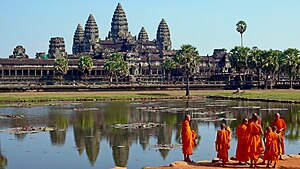 |
| Rainbow Bar owner Kye Poirrier and staff |
In the early hours of Sunday 15 May 2011 the staff and clientele of the gay-friendly Rainbow Bar on Street 172 in Phnom Penh's Daun Penh district were subjected to a vicious and unprovoked homophobic attack by neighbors, which left several people badly injured and caused significant damage to the bar. The establishment had been hosting a drag queen competition as part of Pride Week 2011 celebrations. More worryingly, according to witnesses, police refused to intervene until they had been paid a bribe of US$500.
The attack fell during Pride Week 2011, a week designed to promote tolerance of - and to celebrate - sexual and gender diversity. Pride Week 2011 passed off with great success in Cambodia, with more than 1,300 people showing their support and attending a wide range of events in Phnom Penh, Siem Reap and other parts of the country. It is clear from the popularity of the festivities that ordinary Cambodians are beginning to embrace lesbian, gay, bisexual, transgender and intersexual ("LGBTI") people.
While the attack itself is a matter of concern, the failure of the police to intervene and discharge their duties to maintain the safety and security of the staff and patrons at the bar is a significantly more serious matter. The failure on the part of the police to intervene and arrest the perpetrators at best suggests negligence on their part and, at worst, tacit approval of the attack and its discriminatory motivations. Such failures on the part of the police are likely only to encourage additional homophobic and transphobic sentiments and attacks.
Responding to the violent attack on Rainbow Bar, Ou Virak, President of CCHR, a non-aligned, independent, non-governmental organization that works to promote and protect democracy and respect for human rights throughout Cambodia, commented:
"This is a shocking and entirely unprovoked attack on innocent people peacefully and joyfully celebrating Pride Week 2011. CCHR condemns this heinous and cowardly act, but congratulates the staff of Rainbow Bar for refusing to be cowed by such behavior and having the courage to continue with their Pride Week celebrations after the attack. However, we are gravely concerned by the reports of a lack of police intervention and urge that the attack be properly investigated. The ignorance of a bunch of thugs is one thing; gross negligence on the part of the authorities is altogether more troubling."







![Reblog this post [with Zemanta]](http://img.zemanta.com/reblog_e.png?x-id=ac7721bc-793c-434f-843b-236c822d8cb6)





 Join our page
Join our page

